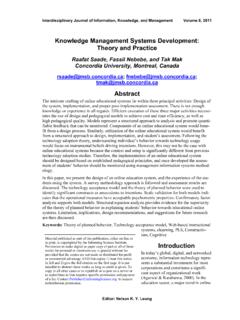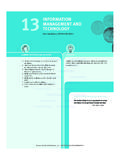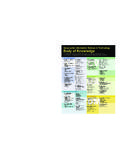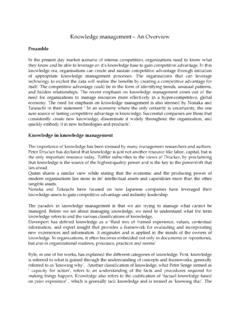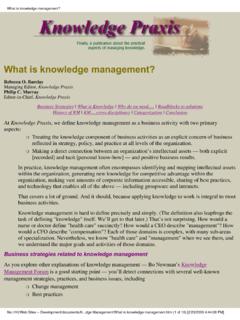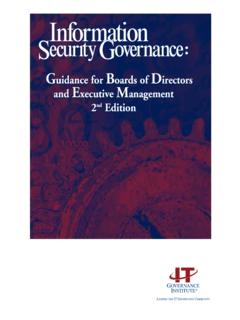Transcription of A Framework for Designing Nursing Knowledge …
1 Interdisciplinary Journal of information , Knowledge , and management Volume 1, 2006. A Framework for Designing Nursing Knowledge management Systems Tzyh-Lih Hsia Li-Min Lin Chinese Naval Academy, Mei-Ho Institute of Technology, Kaohsiung, Taiwan Pingtung, Taiwan Jen-Her Wu and Hsien-Tang Tsai National Sun Yat-Sen University, Kaohsiung, Taiwan Abstract The health care industry is increasingly becoming a Knowledge -based community that depends critically on Knowledge management (KM) activities to improve the quality of care. Utilizing Knowledge management systems (KMS) to manage medical information and health care knowl- edge to support the full spectrum of Knowledge needs in the Nursing process has become an im- portant issue for Nursing professionals. Hence, the objective of this research is to propose a con- ceptual Framework that integrates Nursing process, KM activities, and enabling information tech- nology (IT) for Designing such a Nursing KMS.
2 The Framework indicates the critical Knowledge management activities in Nursing process and the enabling IT based on the task/technology fit theory. With this Framework , KMS developers can work with Nursing professionals to easily identify the suitable IT associated with the Nursing process when developing a Nursing KMS. Keywords: health care, e-health, Knowledge management , Knowledge management systems, Nursing process Introduction Over the past decade, with the rapid advance in information technology (IT), the health care in- dustry has increasingly embraced new IT and net-enabled applications in the search for opportu- nities for higher-quality care (Wu, Hung, Hisa, & Tsai, in press). Recently, a growing interest in the electronic health (e-health) concept is causing significant changes in the healthcare environ- ment (Lin & Umoh, 2002). As health care industry moves into the e-health age, health care or- ganizations are becoming Knowledge -based communities connected to hospitals, clinics, pharma- cies, and customers for sharing Material published as part of this journal, either on-line or in Knowledge , reducing costs, and im- print, is copyrighted by the Informing Science Institute.
3 Permis- proving the quality of care. Thus, the sion to make digital or paper copy of part or all of these works for personal or classroom use is granted without fee provided that the success of e-health depends critically copies are not made or distributed for profit or commercial ad- on the collection, analysis and seam- vantage AND that copies 1) bear this notice in full and 2) give less exchange of clinical and medical the full citation on the first page. It is permissible to abstract information or Knowledge within and these works so long as credit is given. To copy in all other cases across the above organizational or to republish or to post on a server or to redistribute to lists requires specific permission and payment of a fee. Contact boundaries (Bose, 2003). to request redistribution per- mission. Editor: Alex Koohang A Framework for Designing Nursing Knowledge management Systems Consequently, as e-health has become the norm, the barriers to transparent and accessible infor- mation are dissolving.
4 Medical information and clinical Knowledge management issues are be- ginning to emerge. The key challenges in these issues are: (1) how to integrate several disparate and standalone information repositories into a Knowledge -based repository to create a single ver- sion for healthcare professionals, and (2) how to effectively manage this disparate Knowledge using available IT facilities. Managing Knowledge of medical professionals within health care organizations is critical to pros- per in competitive e-health environments (O'Dell & Grayson, 1998). Nurses are Knowledge - intensive and primary professional in health care organizations. They are required to take new Nursing Knowledge and experience that can be acquired through various net-enabled applications or Internet. Nursing professionals are being asked to do more with less in such context. While their Nursing care responsibilities have increased, the IT support of Nursing practices appears to lag far behind.
5 This lack of IT support for Nursing professionals has become an issue of signifi- cant importance. E-health requires better access to IT applications to analyze hospital-wide nurs- ing care information and Knowledge in the Nursing process. As IT capabilities are extended to support a Knowledge -centric view rather than simply a data-centric view, Nursing practices must begin to take advantage of these new capabilities. A well-designed IT-based Knowledge manage- ment system (KMS) has become an ever more central force in improving the quality of care in competitive e-health environments. There is a general consensus that IT-based technologies could be applied to the development of healthcare KMS (Heathfield & Louw, 1999; Ryu, Ho, & Han, 2003). For instance, Kerwin (2002). indicated the importance of the Internet and related technologies in improving healthcare quality and medical KM.
6 Selsy, Eisenberg, Hersh, & Buitendijk (2001) reported that the electronic portal (e-portal) enables hospitals to integrate the medical Knowledge into clinical workflow. Bose (2003) argued that a well-designed healthcare KMS infrastructure should incorporate necessary healthcare processes, tools, and techniques. However, very little is actually known about how to effectively integrate the technologies, Knowledge management activities and the enabling IT in facilitating Nursing Knowledge management practices. To address this problem, a comprehensive Framework that guides the design of a Nursing KMS is necessary. Therefore, the objective of this research is to propose a conceptual Framework , based on task/technology fit (Goodhue & Thompson, 1995), for Designing Nursing KMS which attempts to integrate the relevant enabling IT into the Nursing process that would support Nursing Knowledge creation, application, and management .
7 The proposed Framework would assist the healthcare or- ganizations to identify the critical Nursing KM activities associated with the enabling IT and to plan for the Nursing KMS for the Nursing process. Background E-Health Delivering healthcare services to patients is a complex endeavor that depends highly on health- related information . One of the major impediments in hospital progress toward efficiency and cost-effectiveness is the difficulty in sharing information among health care organizations (Grim- son, Grimson, & Hasselbring, 2000). Over the past decade, the health care industry has increas- ingly tried to embrace new IT, such as telephony, computers and Internet associated technologies, as it searched for opportunities for higher-quality care (Lin & Umoh, 2002). E-health care is cur- rently evolving, which refers to the delivery of healthcare services involving the electronic trans- fer of health-related information using electronic-based technologies (Englebardt & Nelson, 2002).
8 The Healthcare information and management system Society (HIMSS) broadly defined e- 14. Hsia, Lin, Wu, & Tsai health as IT-enabled healthcare system that improves the access, efficiency, effectiveness and quality of clinical and business processes utilized by healthcare organizations, practitioners, and patients in an effort to accomplish some combination of the following objectives: cut costs, in- crease revenues, streamline operations, improve patient satisfaction, and contribute to the en- hancement of medical care. In e-health environments, it has become apparent that healthcare delivery is increasingly informa- tion-intensive; that is, healthcare organizations use more information sources to support clinical activities and care delivery, rather than interacting physically with the document, service, or a confined person (Michael, Goran, & Jean, 2001). In such an environment, a significant challenge is how to integrate several disparate, stand alone information repositories into a single logical re- pository to create a single version of true for all healthcare stakeholders.
9 As healthcare organizations are drowning in information overload, KM is believed to be the cur- rent savior of organizations (King, Marks, & McCoy, 2002). Currently, IT allows for supporting a Knowledge -centric view, e-health solutions must begin to take advantage of these new capabili- ties. The health care industry has increasingly tried to embrace the Knowledge management . enabled technologies and applications to improve the access and transfer of e-health information and Knowledge at all levels (physicians, nurses, therapists, diagnosticians, and pharmacists). The Knowledge management -enabled healthcare system is becoming the new trend in e-health (Bose, 2003). Knowledge management Data becomes information when it can be summarized and organized into logical patterns. Infor- mation becomes Knowledge when it can be manipulated for actionable decision making. In a broad sense, Knowledge management (KM) is a management paradigm that includes concerted, coordinated and deliberate efforts to manage the organizational Knowledge through processes for identifying and leveraging it to enhance the organizations ability to compete.
10 KM is purported to increase innovativeness and responsiveness. According to the study by Davenport & Prusake (1998), most KM projects have one of three aims: (1) to make Knowledge visible and show the role of Knowledge in an organization, mainly through maps, handbook, and hypertext tools; (2) to develop a Knowledge -intensive culture by encouraging and aggregating behaviors such as knowl- edge sharing and proactively seeking and offering Knowledge ; (3) to build a Knowledge infra- structure: a web of connections among people given space, time, tools, and encouragement to in- teract and collaborate. Knowledge management can be viewed as turning data into information and forming information into Knowledge . It is largely regarded as a cyclic process involving various activities (Nonaka, 1991). The process can be subdivided, for example, into creating internal Knowledge , acquiring external Knowledge , storing Knowledge in documents versus storing in routines, as well as updat- ing the Knowledge and sharing Knowledge internally and externally (Alavi & Leidner, 2001).




